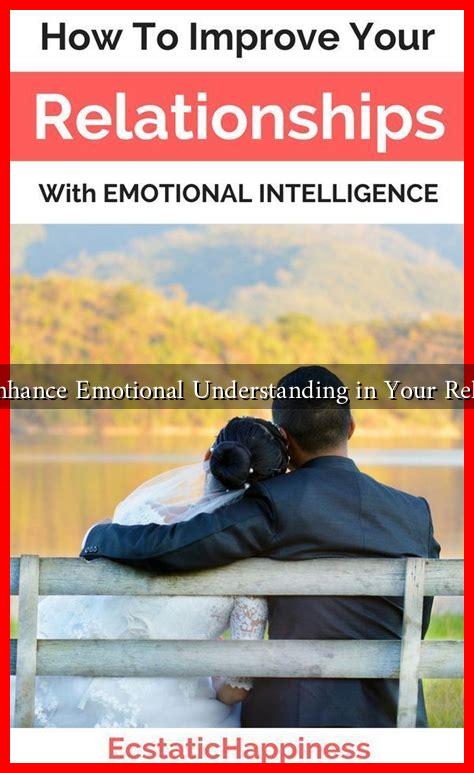-
Table of Contents
How to Enhance Emotional Understanding in Your Relationship
Emotional understanding is a cornerstone of any successful relationship. It involves recognizing, interpreting, and responding to your partner’s emotions in a way that fosters connection and intimacy. In a world where communication often falters, enhancing emotional understanding can lead to deeper bonds and a more fulfilling partnership. This article explores practical strategies to improve emotional understanding in your relationship.
The Importance of Emotional Understanding
Emotional understanding is not just about empathy; it’s about creating a safe space for both partners to express their feelings. Research indicates that couples who communicate effectively about their emotions are more likely to experience relationship satisfaction. According to a study published in the Journal of Marriage and Family, couples who engage in open emotional dialogue report higher levels of intimacy and lower levels of conflict.
Strategies to Enhance Emotional Understanding
Here are several effective strategies to improve emotional understanding in your relationship:
- Practice Active Listening
- Use “I” Statements
- Engage in Regular Check-Ins
- Be Vulnerable
- Learn Each Other’s Love Languages
Active listening involves fully concentrating on what your partner is saying rather than just passively hearing their words. This means making eye contact, nodding, and providing feedback. For example, if your partner shares a stressful day at work, instead of immediately offering solutions, acknowledge their feelings by saying, “That sounds really tough; I can see why you’re upset.”
When discussing feelings, use “I” statements to express your emotions without placing blame. For instance, instead of saying, “You never listen to me,” try, “I feel unheard when I’m talking about my day.” This approach reduces defensiveness and opens the door for constructive dialogue.
Set aside time each week for emotional check-ins. This can be a dedicated time to discuss feelings, concerns, and joys. For example, you might ask each other, “What made you happy this week?” or “Is there anything bothering you that we should talk about?” Regular check-ins can help prevent misunderstandings and build emotional intimacy.
Vulnerability is key to emotional understanding. Share your fears, dreams, and insecurities with your partner. This openness encourages them to reciprocate, creating a deeper emotional connection. For instance, if you’re feeling anxious about a life change, share that with your partner instead of keeping it bottled up.
Understanding how you and your partner express and receive love can significantly enhance emotional understanding. According to Dr. Gary Chapman, author of “The 5 Love Languages,” knowing whether your partner values words of affirmation, acts of service, receiving gifts, quality time, or physical touch can help you connect on a deeper level.
Case Studies and Real-Life Examples
Consider the case of Sarah and Tom, a couple who struggled with communication. After attending a workshop on emotional intelligence, they learned to practice active listening and use “I” statements. Over time, they noticed a significant reduction in arguments and an increase in emotional closeness. They reported feeling more understood and valued in their relationship.
Another example is the story of Lisa and Mark, who implemented weekly emotional check-ins. They found that discussing their feelings regularly helped them navigate challenges more effectively, leading to a stronger partnership. They also discovered that sharing their vulnerabilities brought them closer together.
Conclusion
Enhancing emotional understanding in your relationship is a continuous journey that requires effort and commitment from both partners. By practicing active listening, using “I” statements, engaging in regular check-ins, being vulnerable, and learning each other’s love languages, couples can foster a deeper emotional connection. Remember, the goal is not to eliminate conflict but to navigate it with empathy and understanding. As you implement these strategies, you’ll likely find that your relationship becomes more resilient, fulfilling, and enriched with love.
For further reading on emotional intelligence in relationships, consider exploring resources from the Gottman Institute, which offers valuable insights and tools for couples.

